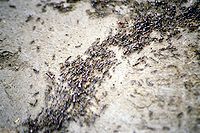
Photo from wikipedia
An adaptive robot control approach that can achieve an accurate approximation of the complex robot dynamics without knowledge unlearning in the case of multiple sequential tasks is proposed in this… Click to show full abstract
An adaptive robot control approach that can achieve an accurate approximation of the complex robot dynamics without knowledge unlearning in the case of multiple sequential tasks is proposed in this article. A locally weighted learning (LWL) model with automatic structure growth according to the size of the learning domain is introduced to approximate unknown robot dynamics, and a composite learning technique with regressor extension is applied to improve parameter convergence. The LWL ensures that learning in one area of the learning domain does not cause unlearning in another area, and the composite learning theoretically guarantees the identification performance of the LWL model. By the exploitation of both stored data in memory and instantaneous data, parameter convergence in the LWL model is achieved under a more achievable interval-excitation condition than the stringent persistent-excitation condition. This further enhances the trajectory tracking performance for multiple sequential tasks, which is generally not achievable by existing approximation-based adaptive robot control approaches. Experimental studies have verified the superiority of the proposed approach over prevalent approaches.
Journal Title: IEEE Transactions on Industrial Electronics
Year Published: 2022
Link to full text (if available)
Share on Social Media: Sign Up to like & get
recommendations!